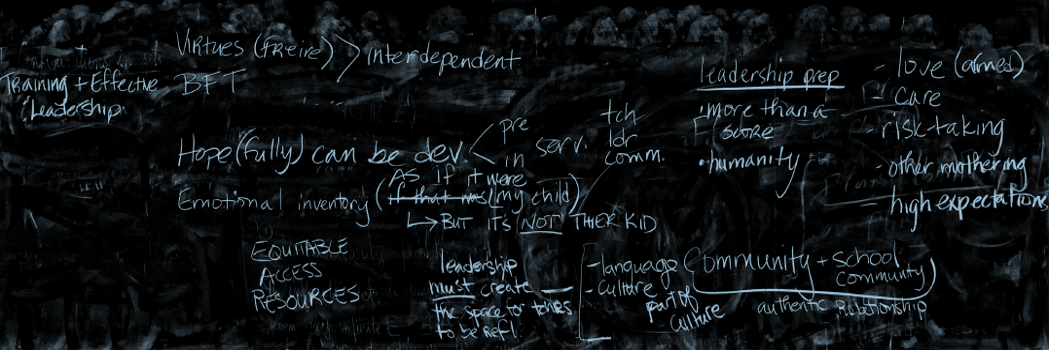The piece that I was struck most by in the Dixson article was the exploration of property and in particular whiteness as property, as it plays out in the “culture of Whiteness” of teacher education programs, and by extension, the teaching profession. I was struck in particular by this line, “Whiteness operates as a form of property by which preservice teachers that possess the experiences, perspectives, knowledge and dispositions aligned with and valued by the dominant White society find reinforcement and success” (p. 128). This is something I think about a lot in terms of the school where I teach, which has an almost all-white administration, and a predominantly white (myself included) teaching staff. Teachers who align with the toxic culture of white supremacy delusion (perfectionism, defensiveness, paternalism, either-or thinking, power hoarding, fear of open conflict, and most central to whiteness culture, anti-Blackness), end up getting into positions of leadership, and perpetuating and reifying this culture, while teachers who do not align with this culture or actively push against it are undermined and pushed out. It is violent for both students and teachers.
I was also struck by what Dixson describes as the “propertied right to determine meaning” (p. 128). I found this exceptionally powerful, and a way to name the dynamics of whiteness that work to ensure its perpetuation, especially in schools and among white educators that self-identify as being “progressive” “caring” “liberal” or “anti-racist”. As Dixson et al explain, white preservice teachers use this aspect of whiteness as property to “construct a definition of White privilege devoid of attention to structural power;” thus ironically exercising “their real White privilege—the propertied right to determine racial meaning—to deny their individual participation in the collective, structural racism that perpetuates racialized student failure. This is an exclusive right only engaged by the dominant racial group.” (p. 128). White teachers and administrators naming themselves as anti-racist, while simultaneously reifying systems of oppression, is the ultimate form of this “propertied right to determine meaning.”
When a critical praxis, such as CRT, is implemented by those with a vested interest in perpetuating and maintaining toxic whiteness and anti-Blackness, then the language of that praxis can be manipulated, flattened, and shifted to serve those interests, while providing a veneer of “progressive liberal goodness”. Ladson-Billings (1995) explained this tension best, when she described it as “the difficulty (indeed, impossibility) of maintaining the spirit and intent of justice for the oppressed while simultaneously permitting the hegemonic rule of the oppressor” (p. 62). I am left wondering how to interrogate and dismantle that particular aspect of whiteness as property, and whether and how a praxis of CRT can do so, or can do so on its own, or can do so if the structures of power remain unchanged.




Hi Lucy! The quotes you pulled out also resonated with me, particularly the connections you draw to white teachers and the culture of whiteness and white supremacy that is rewarded and perpetuated in our school system. I also work in a school that is primarily led by white men and where the majority of teachers are white women, however the majority of students are black. I too have noticed what you reflect on in this post – particularly, white educators claiming they are anti-racist while perpetuating systems of oppression. We attend anti-racist trainings, have a DEI statement in our mission, yet our school remains riddled with oppressive tendencies. I was left with a similar question this week about where do we go from here and how do we interrogate and dismantle the notion of whiteness as property. I am also left wondering about the section in Dixson et al that talks about interest convergence and how that shows up in schools and how it relates to whiteness as property. When it is convenient, white teachers will appear to be allies however if their power or privilege is questioned or threatened, they will act in support of the oppressor. I feel like I have witnessed this firsthand and interrogate it within myself as well – when have I been quiet and not stood up for justice because it was uncomfortable? How can I be a better ally?
Lucy, I was thinking of you and your school lot when I was reading these pieces. That your school has many aspects that are progressive and forward thinking, but does not go so far as to dismantle or even question the status quo. In another class, the professor talked about leaders in power “talking themselves out” of doing the things that might really result in structural change. After reading your response and the article, I began to think that perhaps those that talked themselves out of doing that which might result in structural change are not so innocent, but are hiding behind rhetoric and jargon.